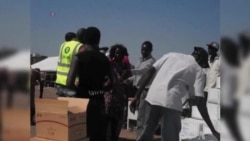The world’s newest nation is struggling with an old problem - violence. South Sudan gained independence from Sudan in July 2011, but since then fighting has claimed what some estimate to be nearly 10,000 lives. The ethnically diverse, oil-rich country is currently torn by heavy fighting between rebels and government forces. The United Nations World Food Program has the difficult task of delivering aid to areas beset with violence.
Violence has forced internally displaced people, or IDPs, in South Sudan to flee their homes, but they still live within within the country’s borders. It’s at camps that the United Nations is able to deliver aid.
“Right now we have access to people who have been affected by the conflict and are living … In these protection of civilian areas, but there are very few places outside those areas in the conflict-affected states that we have been able to access the population," said Valerie Guarnieri, regional director of the U.N.’s World Food Program.
Guarnieri oversees aid to the nearly 100 food-stock sites around South Sudan. But nearly 10 percent of the aid has been stolen. That’s enough to feed these refugees for one month.
Guarnieri says providing safety for aid workers is as much of a challenge outside these camps as raising the money for aid.
“Right now we are relying on food that we prepositioned in South Sudan for other activities, but moving forward we're going to need at least $57 million, but likely more, in order to assist the conflict-affected people," she said.
And the number of those affected by the current conflict is growing. While government and rebel delegates hold peace talks in Ethiopia, forces for two sides clash daily across South Sudan.
On Tuesday, the U.N. said almost 500,000 South Sudanese civilians have been driven from their homes, with 75,000 fleeing to neighboring countries.
The conflict has raised fears the country could slide into all-out civil war - a scenario that could halt the country's oil production, and further destabilize an already unstable part of Africa.
Violence has forced internally displaced people, or IDPs, in South Sudan to flee their homes, but they still live within within the country’s borders. It’s at camps that the United Nations is able to deliver aid.
“Right now we have access to people who have been affected by the conflict and are living … In these protection of civilian areas, but there are very few places outside those areas in the conflict-affected states that we have been able to access the population," said Valerie Guarnieri, regional director of the U.N.’s World Food Program.
Guarnieri oversees aid to the nearly 100 food-stock sites around South Sudan. But nearly 10 percent of the aid has been stolen. That’s enough to feed these refugees for one month.
Guarnieri says providing safety for aid workers is as much of a challenge outside these camps as raising the money for aid.
“Right now we are relying on food that we prepositioned in South Sudan for other activities, but moving forward we're going to need at least $57 million, but likely more, in order to assist the conflict-affected people," she said.
And the number of those affected by the current conflict is growing. While government and rebel delegates hold peace talks in Ethiopia, forces for two sides clash daily across South Sudan.
On Tuesday, the U.N. said almost 500,000 South Sudanese civilians have been driven from their homes, with 75,000 fleeing to neighboring countries.
The conflict has raised fears the country could slide into all-out civil war - a scenario that could halt the country's oil production, and further destabilize an already unstable part of Africa.





